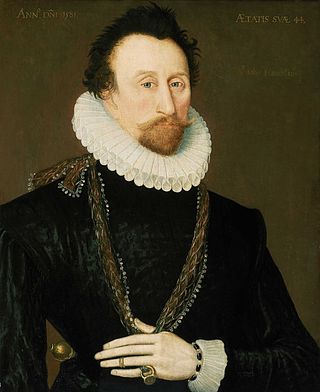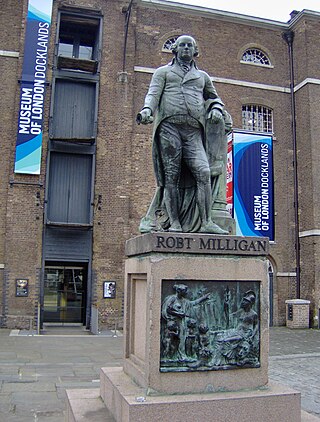Robert Bostock may refer to:
- Robert Bostock (merchant) (1784–1847), English sea merchant
- Robert Bostock (cleric) (1607–1640), archdeacon of Suffolk
- Robert Bostock (slave trader, born 1743), English slave trader
Robert Bostock may refer to:
Thomas King or Tom King may refer to:

Admiral Sir John Hawkins was an English naval commander, naval administrator, privateer and slave trader.

The Royal African Company (RAC) was an English trading company established in 1660 by the House of Stuart and City of London merchants to trade along the West African coast. It was overseen by the Duke of York, the brother of Charles II of England; the RAC was founded after Charles II ascended to the English throne in the 1660 Stuart Restoration, and he granted it a monopoly on all English trade with Africa. While the company's original purpose was to trade for gold in the Gambia River, as Prince Rupert of the Rhine had identified gold deposits in the region during the Interregnum, the RAC quickly began trading in slaves, which became its largest commodity.

Edward Colston was an English merchant, slave trader, philanthropist, and Tory Member of Parliament.

Bunce Island is an island in the Sierra Leone River. It is situated in Freetown Harbour, the estuary of the Rokel River and Port Loko Creek, about 20 miles upriver from Sierra Leone's capital city Freetown. The island measures about 1,650 feet by 350 feet and houses a castle that was built by the Royal Africa Company in c.1670. Tens of thousands of Africans were shipped from here to the North American colonies of South Carolina and Georgia to be forced into slavery, and are the ancestors of many African Americans of the United States.

James Penny was an English merchant and slave trader who was a prominent defender of the Liverpool slave trade. The famous Penny Lane street in Liverpool has been associated with him although it is now widely regarded as of an unconnected origin.
Adam Baldridge was an English pirate and one of the early founders of the pirate settlements in Madagascar.
John or Jack Shaw may refer to:
Ben or Benjamin Smith may refer to:

Bristol, a port city in the South West of England, on the banks of the River Avon, has been an important location for maritime trade for centuries.

Sir Robert Geffrye (1613–1703) was an English merchant, slave trader, and Lord Mayor of London in 1685.
Akitoye, sometimes wrongly referred to as Akintoye, reigned twice as Oba of Lagos; first, from 1841 to 1845, and a second time, from 1851 to 1853. His father was Oba Ologun Kutere and his siblings were Obas Osinlokun and Adele.
Thomas Earle may refer to:
James Birch may refer to:

Maurice Thomson (1601/04–1676), of St Andrew's parish, Eastcheap, City of London and of Haversham in Buckinghamshire, was an English merchant, slave trader and Puritan, said to be "England's greatest colonial merchant of his day". He obtained a monopoly of the Virginia tobacco trade.
Robert Bostock was an English merchant sailor. Who along with John McQueen, were accused of co-owning a Slave Factory on the Saint Paul River, nowadays in Liberia.

A statue of Robert Milligan was installed at the West India Docks in London, in 1813. Milligan was a merchant, and was largely responsible for the construction of the West India Docks. After being put in storage in 1943, it was re-erected by the London Docklands Development Corporation in 1997.
Robert Bostock was an English slave trader, who was born in Tarvin, Cheshire. He was held to be a "very considerable African merchant". His letterbooks for the period 1779-92 have been found to be very useful for historians researching the slave trade of that era. They provide information about his prolific career. Which is ironic as his family tree now includes two mixed race Aboriginal branches.

St Anne's Church was a Church of England parish opened in Liverpool, on 25 October 1772. It had been built at the expense of Thomas and Richard Dobb, cabinetmakers, of Williamson Square and Henry North, fruit merchant, Dale Street. They owned the land on which it was built. At the time the area was still quite rural. They applied to Parliament of Great Britain for the passage of the Richmond Chapel, Lancashire Act 1772, to enable the completion of the church as a chapel of ease.

Thomas Foxcroft (1733–1809) was an English slave trader. He was responsible for at least 91 slave voyages in the years between 1759 and 1792. A contemporary set of financial accounts for one slave voyage by his slave-ship Bloom has been preserved. Captain Robert Bostock, Bloom's master, bought 349 enslaved people in Africa; 42 captives died and 307 captives were sold in the West Indies for £9858. The net profit on the voyage to the owners amounted to £8,123 7s 2d, or £26 9s 2d per captive sold.